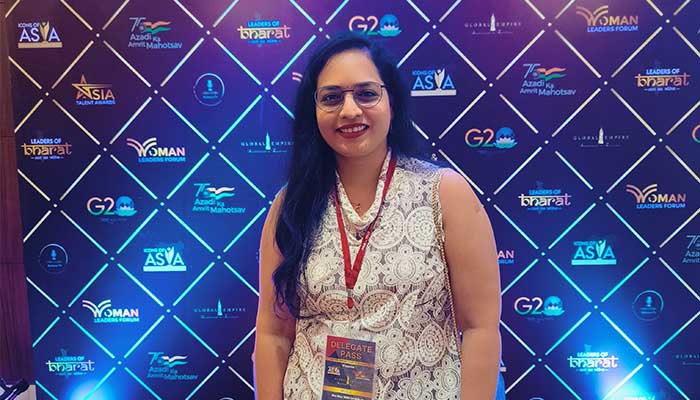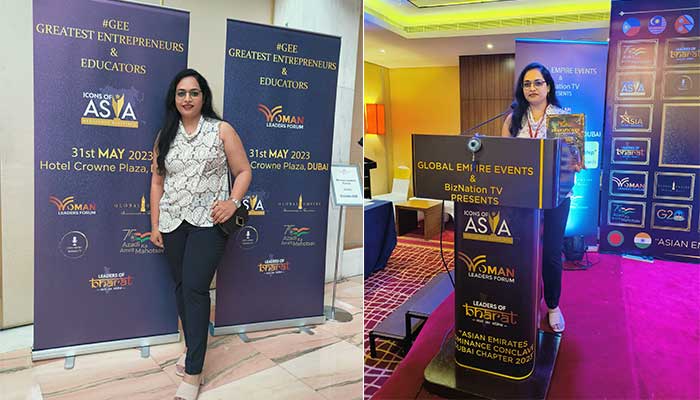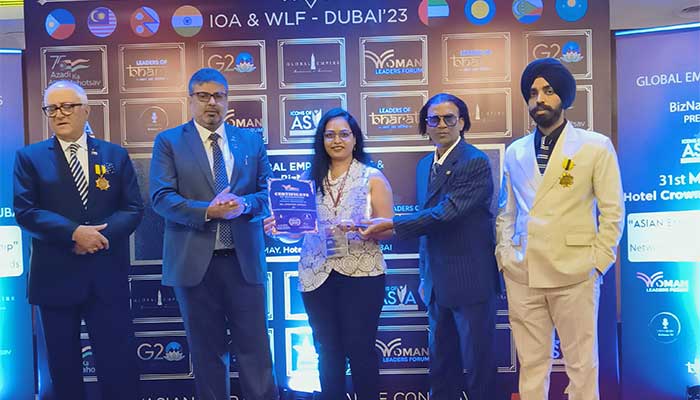Holder of two patents for groundbreaking work in AI-driven VLSI design, Deepthi Amuru has recently won an ‘Award for contribution at the international level’ in the education and business sector at the Women Leaders Forum held in Dubai in May 2023.
Going ‘back to school’ as an adult is challenging. And typically dealing with academics is the least of your problems. When Deepthi Amuru signed up for the Post Graduate Student Status Programme (PGSSP) at IIITH in 2016, she was returning to academia as a part-time student but a full-time mother of two, one of whom was a mere toddler. This Kadapa-born, MTech graduate in VLSI System Design from JNTUA had kicked off her career as an Assistant Professor at G. Narayanamma Institute of Technology and Science (for women) (GNITS), Shaikpet where she worked for a decade. Fascinated by VLSI from the very start, Deepthi had actively participated in workshops and conferences, published several project works and also mentored graduate and undergraduate students in their academic projects. But the need to upskill found herself in pursuit of a PhD for which she first sought out the PGSSP route.
US Patents
In the first semester itself, Deepthi approached Prof. Zia Abbas at the Center for VLSI and Embedded System Technologies (CVEST) and undertook a project under his guidance to demonstrate her research capabilities. It didn’t take long for the professor to recognise her efforts enabling her to transition into a part-time PhD scholar in 2018. “This marks the beginning of my journey in AI/ML-VLSI, a domain that holds great significance in the Electronic Design Automation (EDA) industry,” remarks Deepthi. Two patents granted to her – One American and another Indian – are testimony to her applications of AI in the world of circuitry. “I had the opportunity to collaborate with Analog Intelligent Design Inc. on the design and modelling of self-adapting microelectronic circuits using AI,” she says. It was during this joint effort that Deepthi developed strategies for accurate estimation of analog circuit outputs that could effectively capture variations in the process, voltage and temperature (PVT) through the use of sensors. It led to the award of a US patent titled ‘AI-driven self-adapting microelectronic circuits’. “The applications of this technology are many – from healthcare to space, ultimately enhancing safety and improving the quality of human lives”, she says. Building on this, she has filed for two more US patents which are under review, one of which has also been published as a research paper titled, “Design and fabrication methods of runtime self-tuning analog integrated circuits using machine learning”.

Indian Patent
Another aspect of Deepthi’s research focuses on the design and statistical modelling of PVT-aware digital circuits with the help of AI/ML techniques. To estimate leakage and delay in semiconductor circuits, she successfully developed surrogate models. The models demonstrate computational efficiency and outperform traditional circuit performance estimation tools in terms of speed. However, achieving high accuracy requires large amounts of simulation data, which Deepthi points out is expensive, time-consuming and often impractical in VLSI technologies. In order to address this challenge, she explored a transfer learning-based solution which significantly reduces the training data requirements by 90%. “This approach also enables futuristic estimation of upcoming IC technologies, leading to significant improvements in energy efficiency, reduced material waste, increased productivity, and optimised performance,” she explains, adding that an Indian patent has been filed for this innovation.
Research Publications
The part-time PhD role gradually transitioned into a full time one and she counts the publication of 9 technical papers – “five of which specifically focus on the integration of AI/ML-VLSI” among her achievements. At the International Symposium on VLSI Design and Test (VDAT) 2019, her paper presentation on ‘Statistical variation aware leakage and total power estimation of 16 nm VLSI digital circuits based on regression models’ won her a partial travel grant by IIT Indore. More recently at the VLSI-DAT 2022, her research paper ‘Fast and efficient ResNN and Genetic optimization for PVT-aware performance enhancement in digital circuits’ was nominated for the best paper award.
Women Leaders Forum Recognition
The latest feather in Deepthi’s cap is the ‘Award for contribution at the international level’ in the education and business sector at the Women Leaders Forum held in Dubai in May 2023. The Forum which was set up with the objective of highlighting the work and initiative of bold women leaders selected her for her accomplishments and successes gained through hardwork and perseverance. As a ‘delegate’ from the Asian continent, the award ceremony gave Deepthi an opportunity to network and share knowledge with other icons from various spheres who were present at the platform.

Overcoming Setbacks
The series of awards that have come Deepthi’s way may indicate a smooth sailing, but it couldn’t be further from the truth. “Balancing the demands of my PhD, meeting academic responsibilities at my workplace, and maintaining a fulfilling personal life has always been a challenge. At times, one aspect had to take precedence over the others,” admits Deepthi. The Covid-19 situation may have impacted many researchers adversely but for Deepthi, the period actually gave her an opportunity to focus on research more effectively. By dedicating an average of 14 hours a day from 2018 until late 2021, she managed to achieve a commendable CGPA of 9.16. The intensive work schedule took a toll on her health though. “I was diagnosed with a lower back disk protrusion, necessitating a forced rest and a revised working style,” she says. What drives her to persist? The answer lies in her family. From the constant encouragement and unwavering support from her husband and children to her own parents who continue to inspire, Deepthi speaks admiringly of her mother, a Chemistry professor who was unable to pursue her Doctorate dream. “It serves as a catalyst for me to strive further in my own PhD journey,” she states.
The multifaceted researcher who finds joy in dancing, painting, travelling, cooking and of course spending quality time with her children signs off with her vision of helping strike a harmonious balance between sustainable development and industrial growth. “I would like to deliver ground-breaking solutions to the energy-intensive electronic industry contributing to the reduction of semiconductor waste.”



Next post